Arts & Entertainment
Gays behind the scenes
Personnel trumps thematic content in fall theatrical season
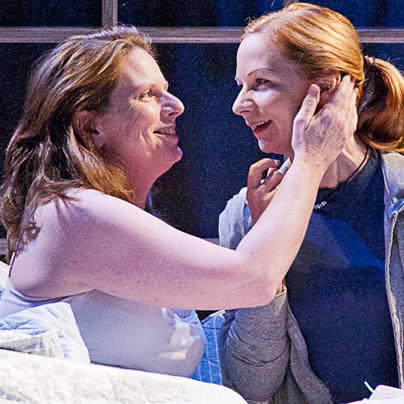
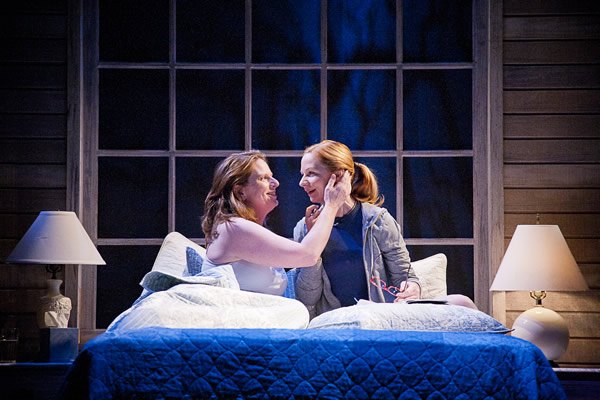
MaryBeth Wise (left) and Susan Lynskey in Theatre J’s ‘Body Awareness.’ (Photo by C. Stanley Photography; courtesy Theatre J)
The new theater season is upon us. And while there’s not a whole lot of LGBT content among the offerings, there is — as always — a wealth of gay talent making it happen.
After a hiatus from the D.C. theater scene, MaryBeth Wise has returned to the stage. Wise, a talented and well-liked local actor who is gay, is currently playing half of a same-sex couple in Theatre J’s production of Annie Baker’s comic drama “Body Awareness” (through Sept. 23). Set in Vermont, the comic drama explores the reaction of Joyce (Wise) and her more uptight partner Phyllis to a visiting photographer and his “male gaze.”
During Wise’s several years off the boards, she concentrated on her other job (network consultant at Library of Congress, National Library Service for the Blind and Physically Handicapped). She also picked up a degree in library science. “But I missed acting,” says Wise. “In ‘Body Awareness’ my character is going through a journey of self-discovery. Learning about what she wants. It’s a wonderful part. Hopefully it will lead to more opportunities.” (washingtondcjcc.org)
Also this fall, Wise’s real life partner Sarah Marshall is playing several parts in the Shakespeare Theatre Company’s season-opener, Gogol’s satire of provincial Russian bureaucracy “The Government Inspector” (Sept. 13-Oct. 28). (shakespearetheatre.org)
At Tony Award-winning Signature Theatre in Shirlington, the season has already begun with a production of “The Best Little Whorehouse in Texas” (through Oct. 7). Staged by the company’s gay artistic direction Eric Schaeffer, the rollicking musical stars Sherri L. Edelen (as brothel madam Miss Mona). The big cast features reliably excellent Signature vets Matt Conner and Stephen Gregory Smith (both gay).
Also at Signature, the company’s talented and versatile associate artistic director Matthew Gardiner directs gay playwright Christopher Shinn’s “Dying City” (Oct. 2-Nov. 25). It’s the story of young man grappling with his identical twin’s suspicious death in Iraq. Incidentally, Gardiner, who is gay, is also a twin.
Following “Dying City,” Gardiner directs Signature’s production of the Tony Award-winning musical “Dreamgirls” (opens Nov. 13). (signature-theatre.org)
At Synetic Theater, up-and-coming actor Alex Mills plays the challenging title role in the company’s season opener, “Jeckyll and Hyde” (Sept. 20-Oct. 21). Synetic is a movement-based company renowned for innovative and athletic choreography and hard-bodied casts. (synetictheater.org).
“One Night With Janis Joplin” opens at Arena Stage Sept. 28 with Mary Bridget Davies in the title role. Staged like a Joplin concert, the piece was written and will be directed by Randy Johnson, who’s gay. Kathleen Turner continues her run there as Molly Ivins in “Red Hot Patriot” through Oct. 28. (arenastage.org)
Alexandria’s MetroStage opens its season with “Jacques Brel is Alive and Well and Living in Paris” (through Oct. 21), a musical revue celebrating the work of the late Belgian singer/songwriter. Respectively directed and choreographed by the talented team of Serge Seiden and Matthew Gardiner (both gay), the production features a top-notch cast including the talented Natascia Diaz (who appeared in the 2006 Off-Broadway production), Bayla Whitten, Sam Ludwig and local favorite Bobby Smith (who is gay) singing a score comprised of plaintive ballads, rousing anthems, tango and rock. (metrostage.org)
After “Jacques Brel,” Bobby Smith directs the Olney Theatre Center’s production of Rodgers and Hammerstein’s beloved musical “Cinderella” (Nov. 14-Dec. 30). (olneytheatre.org)
In October, the Studio Theatre presents the world premiere of “Dirt” (opens Oct. 17). Penned by Byron Lavery (the author of “Frozen”), the play is described by Studio as an “exploration of the mess people make of themselves and their relationships.” Part of the company’s Lab Series, the production is staged by Studio’s artistic director David Muse and reunites talented actors Holly Twyford and Matthew Montelongo (both gay). The talented duo has been successfully paired before in Vassily Sigarev’s “Black Milk” at Studio and Douglas Carter Beane’s comedy “The Little Dog Laughed” at Signature Theatre. (studiotheatre.org)
Fledgling company force/collision is premiering Erik Ehn’s “Shape” (Sept. 20-Oct. 6). Part of a series of 17 plays exploring themes of genocide and reconciliation, “Shape” centers on the lives of the two African-American vaudevillians Billy and Cordelia McClain as they negotiate their identity as artists while struggling with conditions of social and political marginalization. The production has been cast cross gendered, says director John Moletress (who is gay), as both a performance device for our ensemble and also a homage to black vaudevillians of the early 20th century who played cross gendered roles. (force/collision.org)
Forum Theatre kicks off the season with the world premiere comedy “Holly Down in Heaven” (Sept. 27-Oct. 20), written by young playwright Kara Lee Corthron. Forum’s website described the title character as “a brilliant 15-year-old born-again Christian, [who after becoming pregnant] banishes herself to the basement and confides only in her dolls, particularly a life-size psychiatrist doll that closely resembles Carol Channing.”
Parker Drown plays Yager, the neighbor suspected of getting Holly pregnant. Drown (who is gay) won a Helen Hayes Award for his performance as Angel, the feisty drag queen battling gentrification and AIDS in Keegan Theatre’s production of the rock opera “Rent.” Forum Theatre is in residence at Round House Silver Spring. (forumtheatre.org)
A couple other theaters that always have interesting productions and are worth checking out include 1st Stage Theatre (1524 Spring Hill Road) in McLean, Va. (1ststagespringhill.org), Woolly Mammoth Theatre Company (641 D Street N.W.) in D.C. (woollymammoth.net) and Olney Theatre Centre in Olney, Md. (2001 Olney-Sandy Springs Road; olneytheatre.org).

Cupid’s Undie Run, an annual fundraiser for neurofibromatosis (NF) research, was held at Union Stage and at The Wharf DC on Saturday, Feb. 21.
(Washington Blade photos by Michael Key)
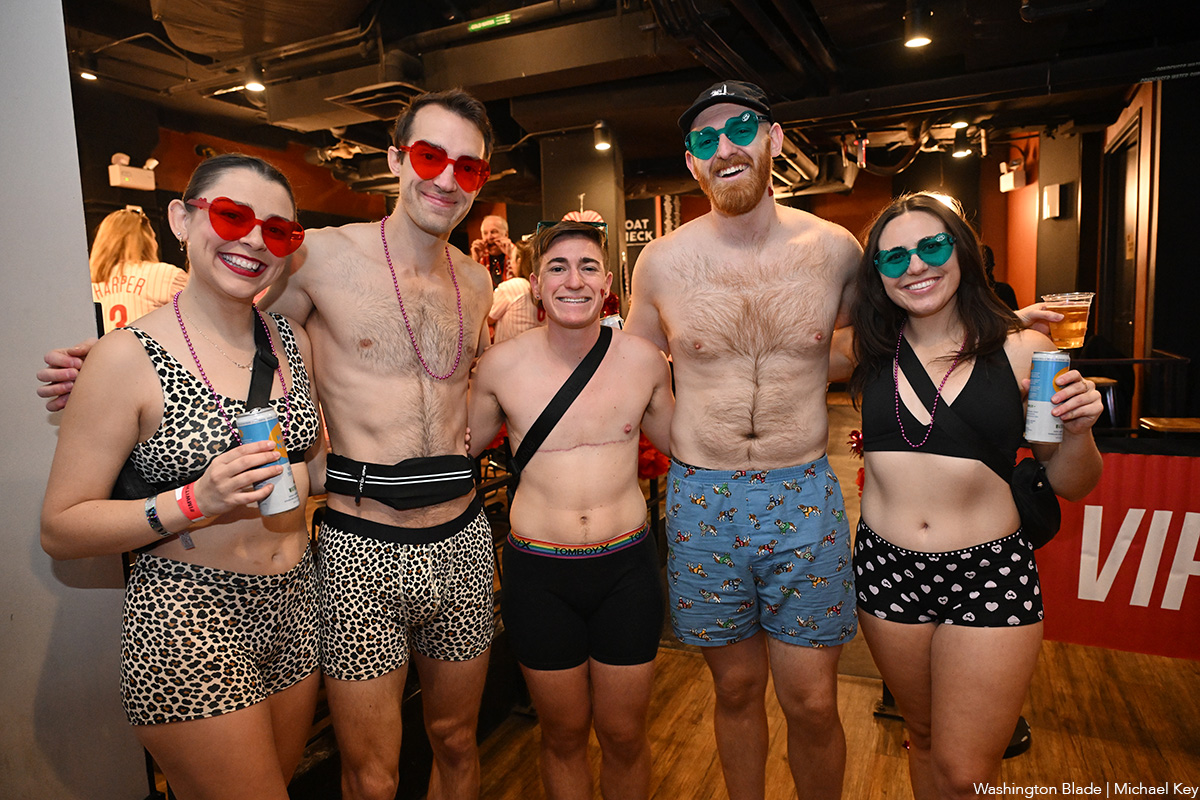

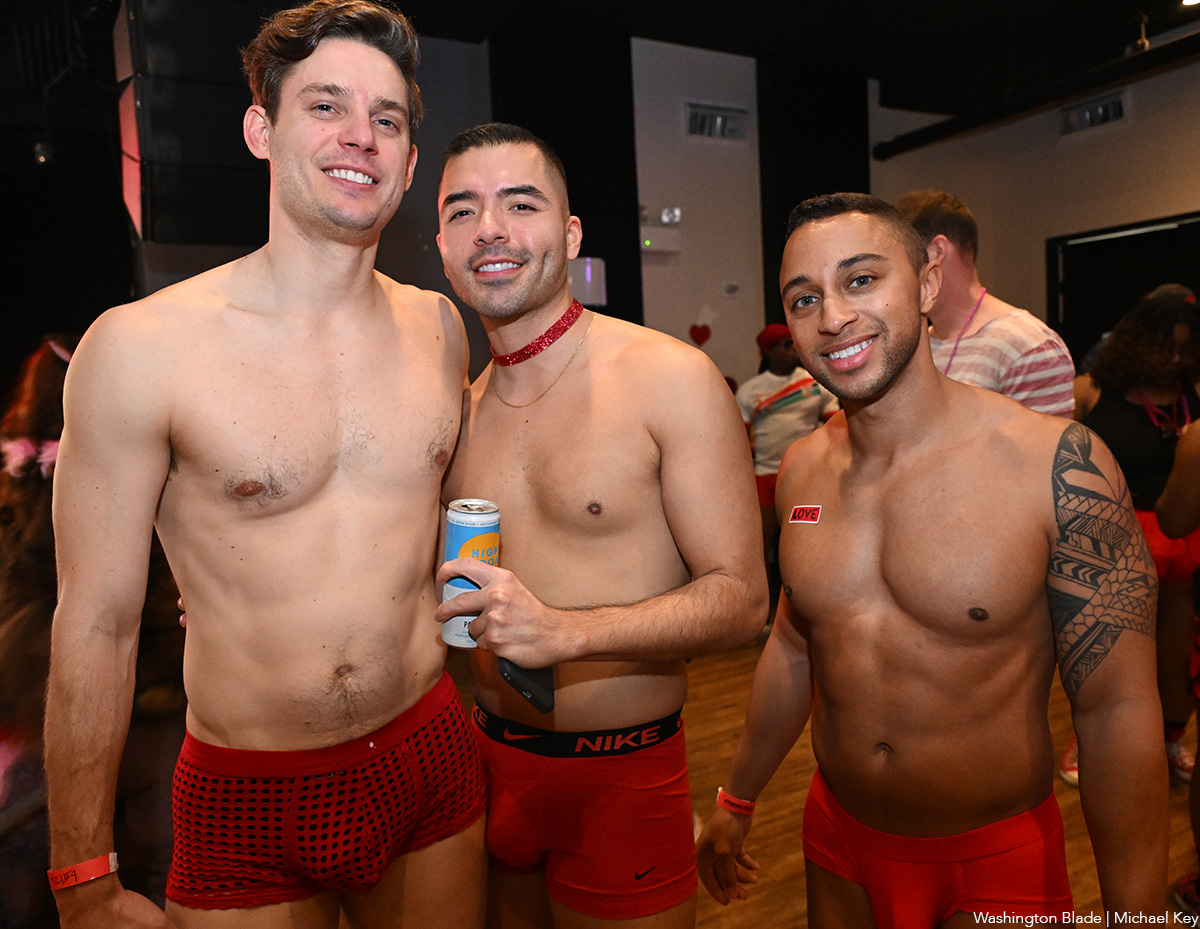





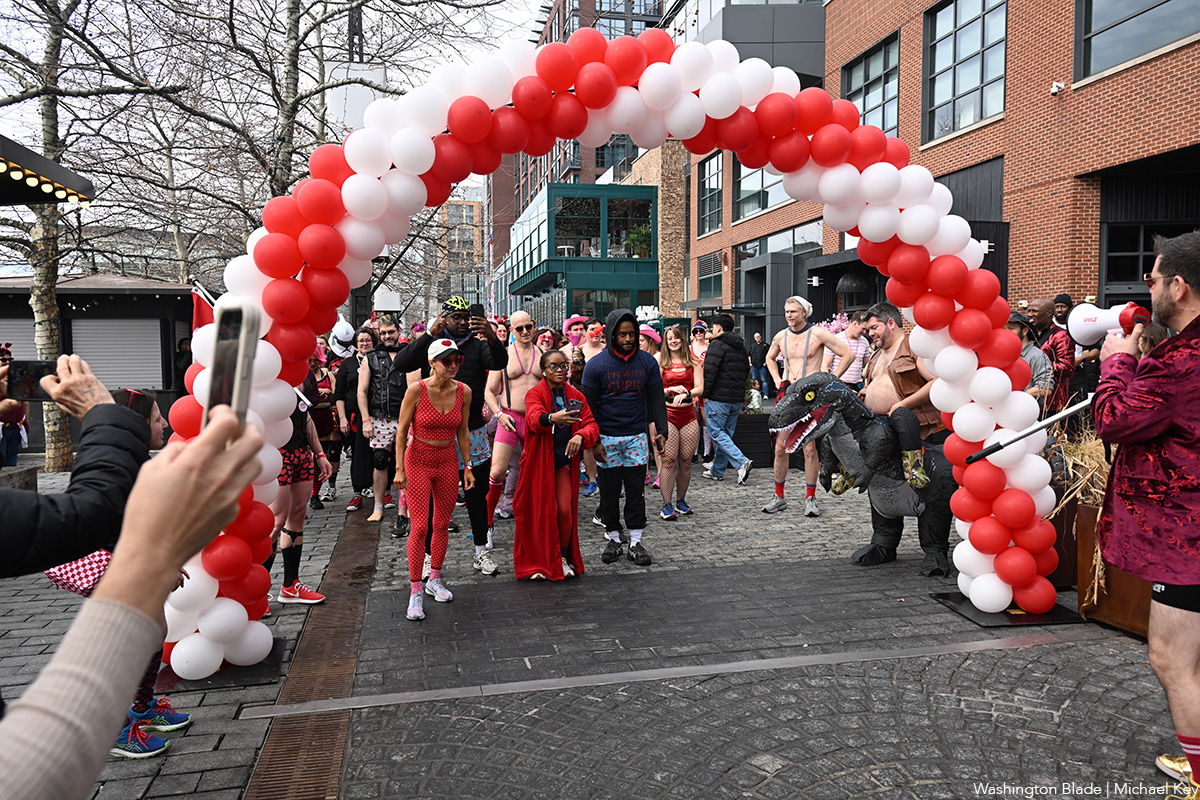
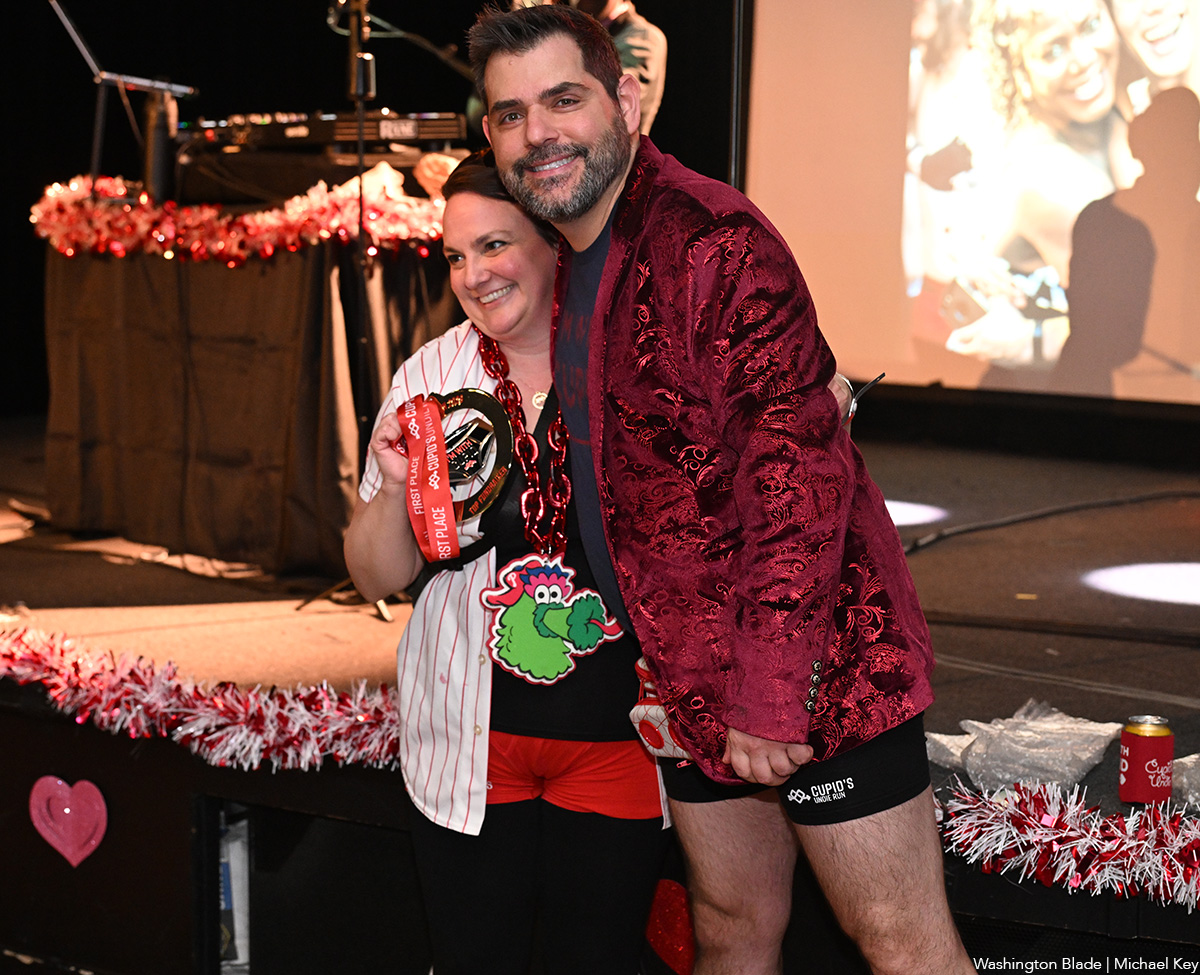
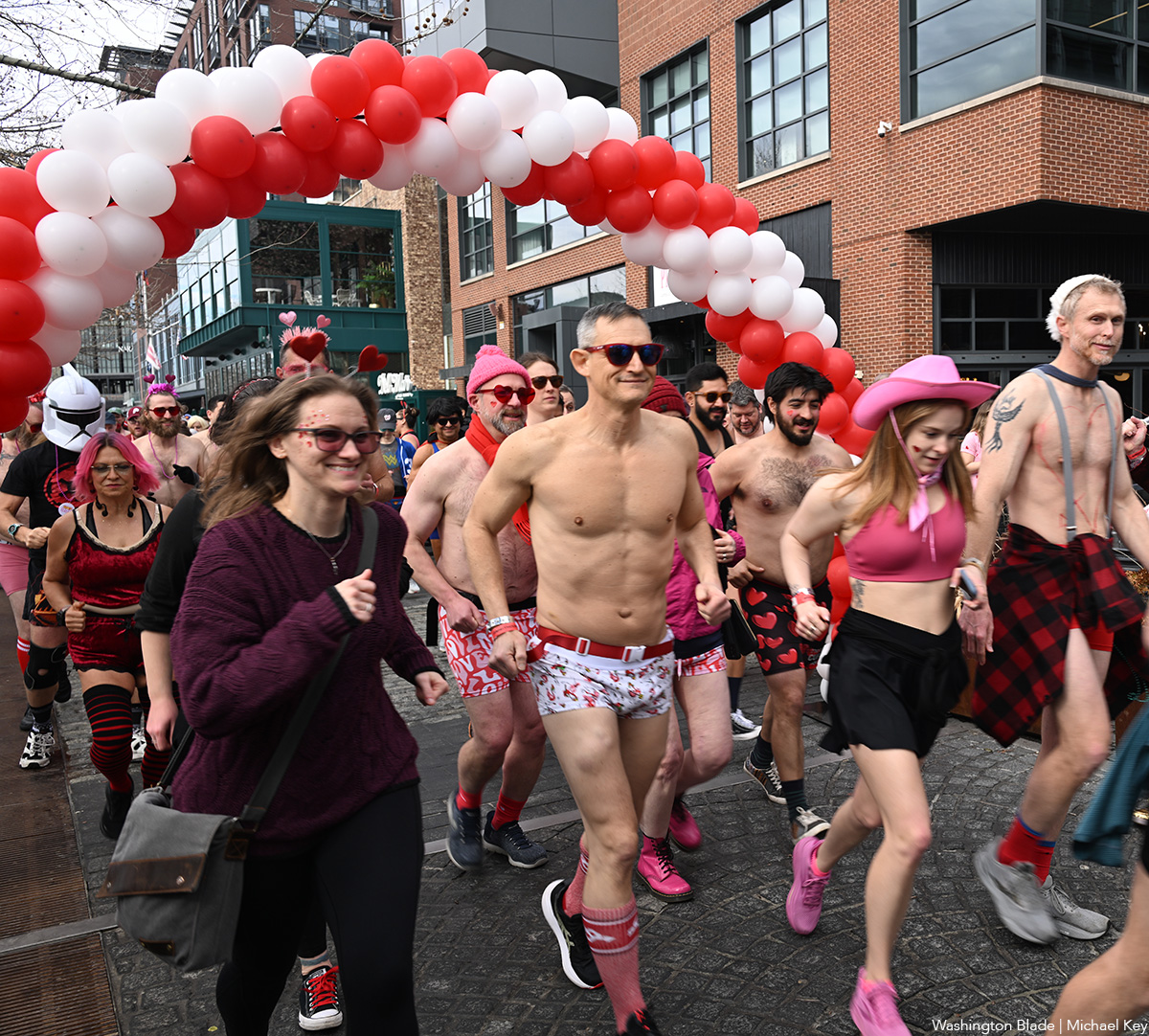

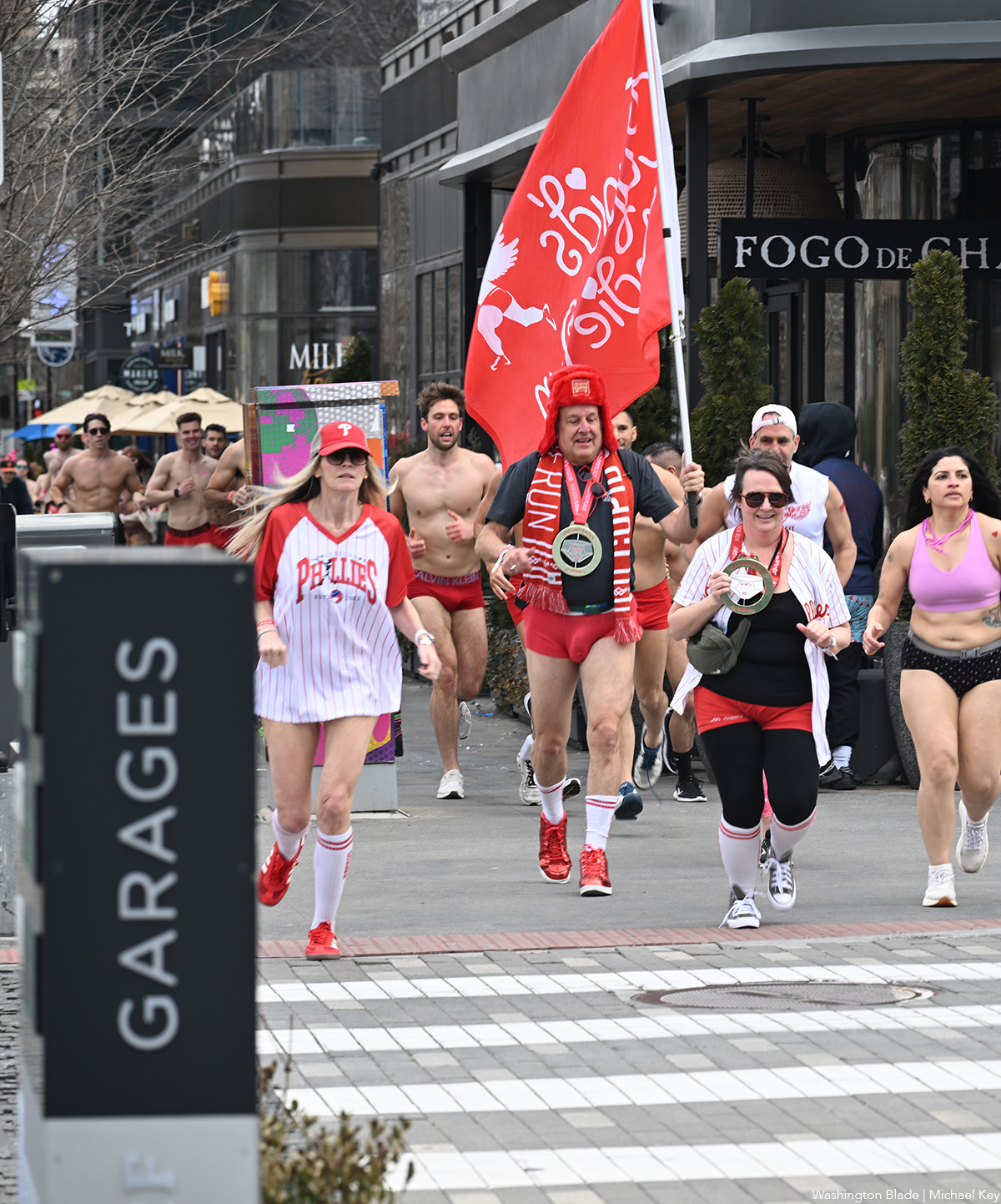

Sweat DC is officially expanding to Shaw, opening a new location at 1818 7th St., N.W., on Saturday, March 28 — and they’re kicking things off with a high-energy, community-first launch event.
To celebrate, Sweat DC is hosting Sweat Fest, a free community workout and social on Saturday, March 14, at 10 a.m. at the historic Howard Theatre. The event features a group fitness class, live DJ, local food and wellness partners, and a mission-driven partnership with the Open Goal Project, which works to expand access to youth soccer for players from marginalized communities.
For more details, visit Sweat DC’s website and reserve a spot on Eventbrite.

Friday, Feb. 20
Center Aging Monthly Luncheon with Yoga will be at noon at the D.C. LGBTQ+ Community Center. Email Mac at [email protected] if you require ASL interpreter assistance, have any dietary restrictions, or questions about this event.
Trans and Genderqueer Game Night will be at 7 p.m. at the D.C. Center. This will be a relaxing, laid-back evening of games and fun. All are welcome! We’ll have card and board games on hand. Feel free to bring your own games to share. For more details, visit the Center’s website.
Go Gay DC will host “First Friday LGBTQ+ Community Social” at 7 p.m. at Hotel Zena. This is a chance to relax, make new friends, and enjoy happy hour specials at this classic retro venue. Attendance is free and more details are available on Eventbrite.
Saturday, Feb. 21
Go Gay DC will host “LGBTQ+ Community Brunch” at 11 a.m. at Freddie’s Beach Bar & Restaurant. This fun weekly event brings the DMV area LGBTQ community, including allies, together for delicious food and conversation. Attendance is free and more details are available on Eventbrite.
LGBTQ People of Color will be at 7 p.m. on Zoom. This peer support group is an outlet for LGBTQ People of Color to come together and talk about anything affecting them in a space that strives to be safe and judgement free. There are all sorts of activities like watching movies, poetry events, storytelling, and just hanging out with others. For more information and events, visit thedccenter.org/poc or facebook.com/centerpoc.
Sunday, Feb. 22
Queer Talk DC will host “The Black Gay Flea Market” at 1 p.m. at Doubles in Petworth. There will be more than 15 Black queer vendors from all over the DMV in one spot. The event’s organizers have reserved the large back patio for all vendors, and the speak easy for bar service, which will be serving curated cocktails made just for the event (cash bar.) DJ Fay and DJ Jam 2x will be spinning the entire event. For more details, visit Eventbrite.
Monday, Feb. 23
“Center Aging: Monday Coffee Klatch” will be at 10 a.m. on Zoom. This is a social hour for older LGBTQ adults. Guests are encouraged to bring a beverage of choice. For more information, contact Adam at [email protected].
Tuesday, Feb. 24
Coming Out Discussion Group will be at 7 p.m. on Zoom. This is a safe space to share experiences about coming out and discuss topics as it relates to doing so — by sharing struggles and victories the group allows those newly coming out and who have been out for a while to learn from others. For more details, visit the group’s Facebook.
Genderqueer DC will be at 7 p.m. on Zoom. This is a support group for people who identify outside of the gender binary, whether you’re bigender, agender, genderfluid, or just know that you’re not 100 percent cis. For more details, visit genderqueerdc.org or Facebook.
Wednesday, Feb. 25
Job Club will be at 6 p.m. on Zoom upon request. This is a weekly job support program to help job entrants and seekers, including the long-term unemployed, improve self-confidence, motivation, resilience and productivity for effective job searches and networking — allowing participants to move away from being merely “applicants” toward being “candidates.” For more information, email [email protected] or visit thedccenter.org/careers.
Asexual and Aromantic Group will meet at 7 p.m. on Zoom. This is a space where people who are questioning this aspect of their identity or those who identify as asexual and/or aromantic can come together, share stories and experiences, and discuss various topics. For more details, email [email protected].
Thursday, Feb. 26
The DC Center’s Fresh Produce Program will be held all day at the DC Center. To be more fair with who is receiving boxes, the program is moving to a lottery system. People will be informed on Wednesday at 5 p.m. if they are picked to receive a produce box. No proof of residency or income is required. For more information, email [email protected] or call 202-682-2245.
Virtual Yoga Class will be at 7 p.m. on Zoom. This free weekly class is a combination of yoga, breathwork and meditation that allows LGBTQ community members to continue their healing journey with somatic and mindfulness practices. For more details, visit the DC Center’s website.




















